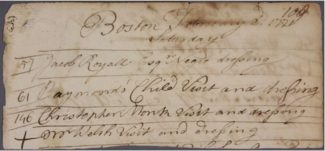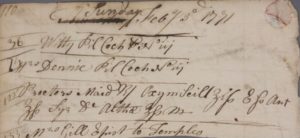Author: Joseph Warren
Date: February 2-3, 1771
Source: Two sided day book page fragment in Joseph Warren’s handwriting, no signature. Sold at Kaminski’s Thanksgiving Auction November 30, 2008, Lot 008B for $550 plus 20% buyer’s premium. The document is currently presumed to be in private hands. Images by permission of Kaminski Auctions, Beverly, MA.
As listed by the auctioneer in 2008: “Life and Times of Joseph Warren (Boston, 1865, 1st Ed.) Condition: Poor (hinges cracked, spine covering gone, stained; with ledger fragment dated 1771, by Warren in which he lists visit to Christopher Monk (Boston Massacre) 6″ x 3″.” This page passed through the hands of 19th century collector Ellis Ames, as have all known surviving fragments of Warren’s lost account books I have been able to trace. See drjosephwarren.com recent entries here and here for other such fragments. I will publish additional ones in coming weeks.
Discussion: I present here another partial page from Joseph Warren’s lost account book from 1771. Though fragmentary, details of Joseph Warren’s medical practice, not otherwise available in primary sources, are revealed.
“Jacob Royall, Esq.’s Negro” may have been an enslaved servant of the well-off Loyalist Royall family. It is interesting to note that Dr. Warren cared for a member of an important Loyalist household in the early 1770s. In the mid-1760s his patients had included leading Loyalists such as the Hutchinsons and Olivers. Most had ceased seeking his medical care by the late 1760s, roughly coincident with Warren’s growing Whig activism and tensions surrounding the first British Army occupation of Boston.
This account book fragment, not heretofore generally known to historians, confirms that Dr. Joseph Warren provided clinical care to Christopher Monk almost a year after the March 5, 1770 Boston Massacre. J.L. Bell in his Boston1775 blog discussed the unfortunate life of Christopher Monk, who suffered a gunshot wound of the chest at the Boston Massacre. Monk became chronically debilitated and eventually succumbed to those wounds in April 1780, the “last victim of the Boston Massacre.”
If and when the pages are found covering the period of the Tea Crisis and Destruction of the Tea – November and December of 1773 – historians will have to rewrite the history of that pivotal event to include Joseph Warren’s role with more certainty than is currently warranted.
Posted August 7, 2018.


 Follow
Follow